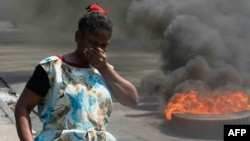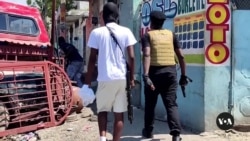Haitian leaders are rushing to meet a looming deadline to name the members of a transitional council that will take power after the resignation of Prime Minister Ariel Henry.
Henry resigned late Monday under pressure from the United States and the leaders of the regional body Caribbean Community, or CARICOM. The proposal for the transitional council to govern violence-plagued Haiti emerged Monday during a meeting of CARICOM leaders in the Jamaican capital, Kingston.
Under the plan, six people representing various Haitian political coalitions will be on the transitional council, along with a seventh from the private sector. The seven will be voting members.
There also will be two non-voting members — one from civil society and one from the interfaith community, according to CARICOM. The council will select an interim prime minister and prepare to hold the next presidential elections.
U.S. Secretary of State Antony Blinken told reporters on Wednesday that he spoke with Kenyan President William Ruto, whose country is expected to lead an international security mission to Haiti to help restore order.
"I was on the phone this morning with President Ruto of Kenya, who confirmed Kenya's preparedness to lead that that mission, as soon as the new council is stood up, which we believe will happen in the next couple of days, and an interim prime minister is selected. That mission can move forward," said Blinken.
U.S. State Department spokesman Matthew Miller said early Tuesday afternoon that under the terms of Monday's agreement, "we expect that the members of the transitional council will be appointed in the next 24 to 48 hours."
The council will “take the step to appoint an interim prime minister in the near future after that,” said Miller during the daily briefing.
Meanwhile, the U.S. Defense Department said that at the request of the State Department, its Southern Command has deployed a U.S. Marine Fleet-Anti-terrorism Security Team “to maintain strong security capabilities” at the U.S. Embassy in Port-au-Prince, the Haitian capital.
The U.S. said its embassy remains open and limited operations continue, focused on assisting Americans in Haiti and “supporting Haitian-led efforts to secure a peaceful transition of power.”
The Defense Department said it is working with the Multinational Security Support mission to help the Haitian National Police restore security.
At the same time, the United Nations said Wednesday it is reducing its footprint in Haiti because of the volatile security situation.
A spokesperson said non-essential personnel would be reduced, while those carrying out "lifesaving activities" will stay to continue operations. The organization has about 1,500 personnel in Haiti.
"The U.N. is not leaving Haiti," spokesperson Stephane Dujarric said.
In announcing the transitional government plan, CARICOM said “Haitians deserve a country where children can go to school, and their parents know they will be safe. We commend the willingness and courage of Haitian stakeholders to commit to put Haiti back on a path toward democracy, stability, and prosperity.”
Henry resigned a week after his plane was forced to land in the U.S. Caribbean territory of Puerto Rico when it was denied entry into the Dominican Republic, which shares the island of Hispaniola with Haiti.
Henry had departed Haiti the week before on a mission to the South American nation of Guyana and the east African nation of Kenya to gain support for the deployment of a multinational United Nations peacekeeping force to Haiti, which has been plagued by brutal and uncontrolled gang violence in the capital, Port-au-Prince, and beyond.
The gangs used Henry’s absence to attack the National Penitentiary and another prison in Port-au-Prince, killing several people and allowing thousands of inmates to escape into the city. Gangs also staged shooting attacks on Haiti’s main airport.
Jimmy "Barbecue" Cherizier, the leader of an alliance of gangs that staged the attacks, said the gangs would not allow Henry to return to Haiti and urged him to resign.
Plans to deploy a multinational force to Haiti were delayed Tuesday when Kenyan officials said the country will not send its peacekeepers to Haiti until the new interim government is in place.
Henry, a neurosurgeon by profession, has served as acting prime minister since the 2021 assassination of President Jovenel Moise plunged the Caribbean nation into chaos. He had been scheduled to step down in February, but delayed elections due to the worsening security situation and a political stalemate with opposition forces.
The violence has triggered a humanitarian crisis, displacing 360,000 Haitians and pushing millions more to the brink of starvation. Jean-Martin Bauer, the director of the World Food Program's Haiti division, told reporters Tuesday that 4 million Haitians are dealing with food insecurity, while 1 million more face famine.
Blinken pledged Monday that Washington would contribute an extra $100 million to support the U.N.-backed security force in Haiti, along with another $33 million in humanitarian aid. He made the pledge in Kingston, where he took part in the CARICOM conference.








